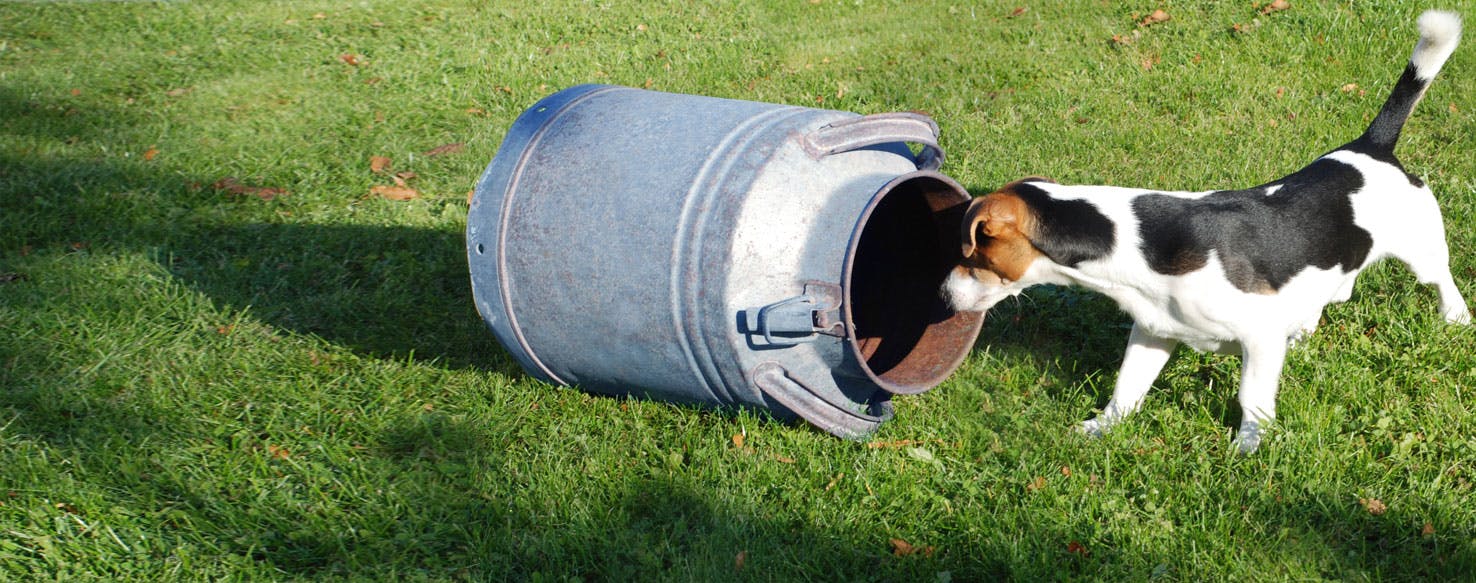- Home
- The Daily Wag!
- Senses
- Can Dogs be Lactose Intolerant?

As humans, we love our pups more than anything, and with that, we love to share with them. Treats? Absolutely. Toys? You betcha. People food? Without a doubt. But when it comes to what you can feed your pup, you have to be cautious.
You probably know a few of the basics, like, chocolate is toxic and garlic might hurt him beyond repair, but did you know that there are specific dogs that shouldn't eat specific things? Did you know that your pup could be, unlike other pups, lactose intolerant?
It's true! Just like people, some doggos can have a harder time digesting lactose than other four-legged friends. If you didn't know, now you do, and we're here to explain all the signs you should look for, how to treat your doggo if you think he's lactose intolerant, and what you can do to avoid any severe episodes.
If you suspect that your pooch may not be able to digest lactose like other dogs, but you're not sure how to tell, we're going to give you a few, quick signs to look out for that may indicate that your pup is suffering from an intolerance.
If you regularly feed your dog cheese, milk, or anything else that contains lactose - a kind of sugar molecule that's broken down by an enzyme known as lactase - and don't survey any kind of different or odd behaviors, he might be just fine with digesting lactose. however, if you notice that your dog tends to be gassy, has loose stool, or vomits after eating dairy products, it's likely that he's not able to digest these things.
That being said, if you notice your pup has a lack of appetite, is having a hard time gaining weight, is itching a lot, and or shows sign of stomach pain after eating these products, it's highly likely that his little body just can't digest the lactose. It's important to note that dairy products aren't typically toxic to dogs, but they also are not a necessity in their diet, and can be harmful to pups that aren't able to digest them properly.
Body Language
Keep an eye out for a few of the following signs that your pup might need to lay off the cheese:
- Shaking
- Panting
- Ears Drop
Other Signs
Take a look at the other signs your dog might be exhibiting to help determine if your little guy is suffering from lactose intolerance.
- Poor Body Condition
- Itching And Scratching
- No Appetite
- Vomiting
- Diarrhea/ Loose Stool
- Flatulence And Abdominal Gas
- Tummy Pain And Discomfort
- Weight Loss
Lactose intolerance is an ailment that used to be thought of as a humans-only condition, but it's quite common for pooches and their bodies to be unable to produce the enzyme that breaks down lactose correctly. In fact, it's one of the most common conditions in the canine community, specifically when dealing with digestive disorders.
Historically speaking, people started realizing doggos could also suffer from this condition relatively recently, thinking often that dairy was either entirely okay or just a toxic food group for animals. Historically, it has affected dogs of all shapes, sizes, breeds, and genders. It simply just depends on your dog's ability to digest lactose and whether or not their bodies are equipped with the enzyme needed to do so.
To help explain lactose intolerance and how it can affect your doggo, we thought we'd get a bit deeper into the science of it all.
Like we mentioned before, lactose is a nutrient that is found in milk and other dairy products. Lactose is a sugar that's made up of two sugar molecules that are chemically linked together, and in order to be digested properly, your pup's body has to be able to produce the right chemicals to break it down.
That right chemical is an enzyme called lactase, something that's produced in your dog's body that splits those lactose molecules and helps them digest properly. If your doggo doesn't produce that enzyme, that's when your pooch can be in trouble.
Milk and dairy products are not considered toxic for pups, and it's even possible that if your dog is emitting these signs, they may simply be allergic to the protein in milk products as opposed to the lactose. That being said, it's important you keep a watchful eye on your doggo's dairy intake, as dairy can be a real, present problem in the canine community.
While there's not a whole lot you can do in the way of training your pooch to stay away from dairy-specific treats on his own (he probably can't tell the difference between a hunk of cheese and a milkbone), there's plenty you can do to get him used to avoiding dairy-based products.
For example, get him used to eating a specific kind of treat and make sure you find a new, dairy-free favorite for him! In addition, train your friends and family. We're sure they love your pup and don't want him to hurt, but sometimes those puppy eyes are too big and beautiful to deny a lick of the ice cream cone. Explain to your pup's surrounding people that that cone could cause more harm than help, and make sure he doesn't eat any of those treats.
Additionally, if your pup's food usually has some dairy in it, gradually get him used to new food and wean him off the dairy as soon as possible.
Have questions or concerns about your pet?
Chat with a veterinary professional in the Wag! app 24/7.
Get Vet ChatWritten by a Great Dane lover Hanna Marcus
Veterinary reviewed by:
Published: 01/26/2018, edited: 04/06/2020
More articles by Hanna Marcus
